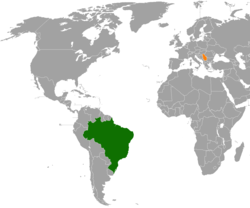Brazilian stance on Kosovo
Brazil does not recognize Kosovo as an independent state and has announced it has no plans to do so without an agreement with Serbia. [2]
In 2008, the Brazilian government reaffirmed its belief that a peaceful solution for the issue of Kosovo must continue to be sought through dialogue and negotiation, under the auspices of the UN and the legal framework of UNSCR 1244. The Foreign Minister of Brazil, Celso Amorim, defended that Brazil should await a UNSC decision before defining its official position on the matter of Kosovo's independence. [3] [4] In 2009, Ambassador of Brazil to Serbia Dante Coelho de Lima stated that "our fundamental position is that we respect Serbia's territorial integrity. We supported Security Council resolution 1244, under which Kosovo is a part of Serbia. We also think that the principle of self-determination should not run counter to respect for international law". [5] In a hearing at the International Court of Justice that same year, the Brazilian delegation said that the unilateral declaration of independence ignored not only the authority of the UNSC, but also the principle of protecting the territorial integrity of states. There is no basis to justify the unilateral declaration of independence in the UNSC Resolution 1244 because it predicted a solution agreed by both parties. Since such an agreement was not reached, the Kosovo dispute can be decided only by the UNSC. [6]
This page is based on this
Wikipedia article Text is available under the
CC BY-SA 4.0 license; additional terms may apply.
Images, videos and audio are available under their respective licenses.


